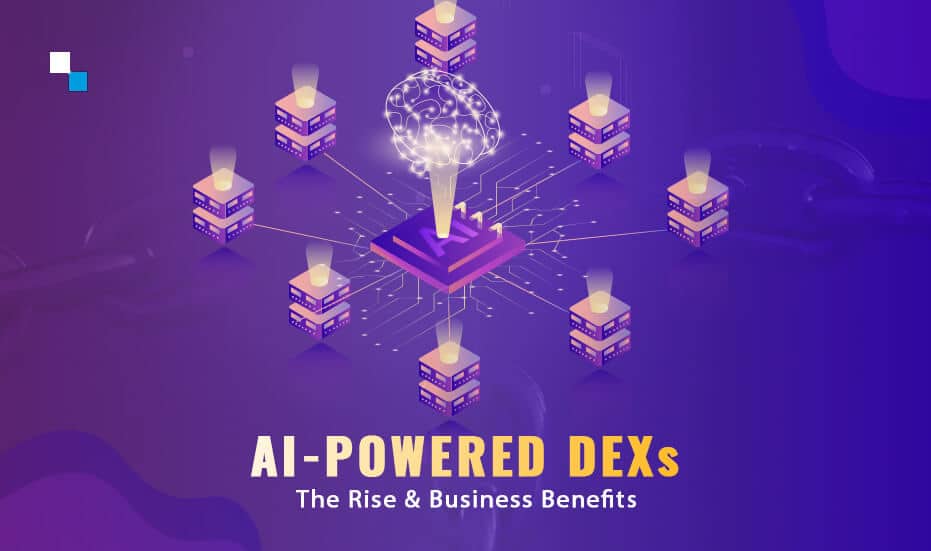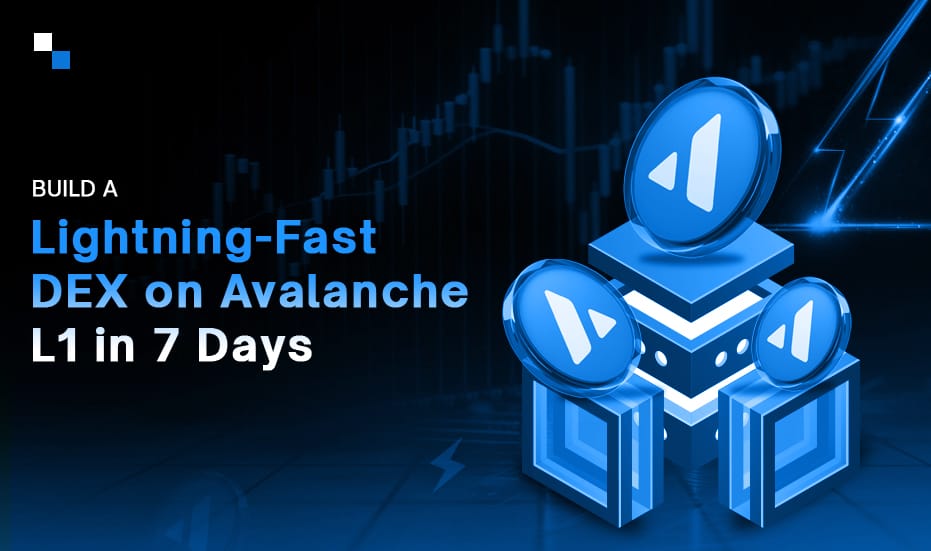
ICO Development – An Ideal Choice For Business Fundraising
May 31, 2023
Metaverse Education Platforms: The Future of Distance Learning
June 1, 2023Table of Contents
Introduction:
Blockchain and artificial intelligence (AI) are two of the most revolutionary technologies catalyzing massive transformations in conventional industries, including finance. The intersection of these disruptive technologies is anticipated to expand their utility individually and develop new advanced systems with extensive capabilities.
Decentralized finance is a prominent use case of blockchain technology that has gained profound attention in recent years. In this blog, we will walk you through the possibilities that arise when AI bleeds into the DeFi, or decentralized finance exchange, setting.
Decentralized Finance Exchange – Market Overview
The global DeFi market size was estimated at USD 13.61 billion in 2022 and is anticipated to demonstrate a compound annual growth rate (CAGR) of 46% from 2023 to 2030. The soaring adoption of decentralized finance is a consequence of its capacity to eliminate intermediaries.
Decentralized exchange (DEX) is a primary use-case of DeFi, whose market share has ascended from less than 1% in 2020 to 10% in 2022. Decentralized crypto exchange software, or DeFi exchanges, are decentralized financial applications designed to facilitate the trade of one digital asset against another. Atomic settlement and real-time transparency are purported benefits of DEXs strengthening their grasp on the market.
The new generation of decentralized finance exchange platforms (especially those run by AMMs) strives to achieve huge growth by leveraging distributed ledger technology to scale, store data, facilitate security, process transactions, maintain customer records, and everything else.
The Rise Of AI-Powered Decentralized Crypto Exchange Software
AI-powered decentralized exchange software combines the elements of AI with the capabilities of blockchain to enable the execution of efficient, intelligent trading. Artificial intelligence can potentially improve and optimize various aspects of an exchange including risk management, liquidity, price prediction, user experience, etc.
Recently, a use case of AI in decentralized finance exchange software solutions has gained tremendous popularity. Fetch.ai allows decentralized exchanges to facilitate peer-to-peer trading based on user-defined parameters using innovative AI-powered software, known as agents. The first-of-their-kind suite of agent-based trading tools aims to amend DeFi trades and scale up the user experience in many ways.
The user experience at decentralized exchange software solutions is often plagued by a poor user interface, inefficient trades, high fees, and central point caveats. AI put in the right place can eliminate inefficiencies and amplify platform capacity. Let’s delve deep into how AI is reshaping the future of decentralized crypto exchange software solutions.
Business Benefits of AI-Powered Decentralized Finance Exchange
AI-powered decentralized crypto exchange software has the potential to transform user experiences through automation, enhanced efficiency, and trust.
- Strengthened Data Security and Mitigated Risks
Blockchain is a reliable technology for storing private financial data. Decentralized finance exchange platforms completely depend on blockchain technology for their transactions and data security.
At present, the data related to transactions or traders is analyzed after it passes through decryption, which increases its exposure to security threats. AI can enable a thorough analysis of large batches of encrypted data, marking a monumental achievement for data security.
Moreover, machine learning (which is a significant subset of AI) can augment anomaly detection and behavioral analysis capabilities. It can be employed to monitor and identify unusual trading patterns, illicit hacking attempts, attacks from unauthorized users, and any kind of suspicious or fraudulent activity in real time.
Another remarkable feature of AI-based systems is their ability to adapt to the latest standards. Therefore, AI-powered decentralized crypto exchange software can independently upgrade its defense mechanisms and stay current.
- Optimizing the Smart Contract Concept
Decentralized exchanges utilize smart contracts to execute on-chain transactions and maintain records. This way, they eliminate the middlemen and make the process worthy of customers’ confidence.
The concept of smart contracts is erroneous in the sense that hackers need to crack a single computer program to exploit the whole decentralized system. By embracing Fetch.ai’s AI agent-based approach, businesses can mitigate the risk of hacks as it eliminates the central point of attack, so there is no single trove of coins to target.
Besides, smart contracts aren’t that smart and can be turned to one’s advantage. Hackers can effortlessly access and review the code of smart contracts line by line to look for loopholes or faults. AI can come to the rescue, verifying smart contracts on decentralized derivatives exchange platforms efficiently and anticipating any data vulnerabilities before any unauthorized user exploits them.
Crystalblockchain reports the theft of more than $2.61 billion of cryptocurrency in the top 10 DeFi security breaches in 2022. By escalating the efficiency of smart contracts with AI, rug pulls and thefts can be minimized. AI and blockchain in tandem can also intelligently fix dynamically generated codes in smart contracts automatically before execution.
- Enhance the Overall Efficiency of Blockchains
The efficiency of blockchain has a direct impact on the functioning of decentralized finance exchange platforms. There are several ways in which AI can boost the efficacy of blockchain networks.
Memory constraints are one of the major issues with blockchain technology. The size of the blockchain expands when more data is added to it. The overly large size of blockchain harms its performance. AI can introduce several methods to downsize the distributed ledger.
Besides, the primitive method to verify blockchain transactions is time-consuming and inefficient. For example, “brute force” is one of the popular hashing algorithms for mining Bitcoin, and it tries every likely combination of characters to verify transactions until it finds the accurate one. AI, if leveraged effectively, can crack the code within a fraction of a minute.
Therefore, by solving memory constraints, upscaling the blockchain’s performance, and mitigating the time required to execute transactions, it will eventually escalate the efficiency of decentralized crypto exchange software.
- Improved Liquidity and Order Execution:
Poor liquidity plagues the cryptocurrency ecosystem, which is why investors choose more liquid digital counterparts such as futures, bonds, stocks, commodities, etc. over them.
The problem of fragmented liquidity arises due to interoperability. As several cryptocurrency trading ecosystems stay confined to their specific blockchains, liquidity aggregators can combine the liquidity of exchanges that exist on the same chains. FLUID Finance uses an AI quant-based crypto liquidity aggregation system to tackle the problem of fragmented liquidity.
Smart order routing is another use case of AI that can expedite and streamline the order execution process by smartly routing orders to different liquidity pools. The protocol decides the liquidity pool for several orders based on order size, fees, market conditions, etc.
AI-based algorithms can analyze historical data, trading patterns, and market trends to identify critical areas requiring liquidity. They can also hone the price adjustment process by rapidly accessing demand and supply dynamics, reducing spreads, and making the decentralized finance exchange more trader-friendly.
- Augmented User Experience:
A positive user experience (UX) plays a crucial role in the adoption and success of a trading platform. It refers to the usability and satisfaction derived by a customer from interacting with a trading platform.
Many beginner traders refrain from using decentralized exchanges due to the difficult-to-navigate user interface (UI). AI-powered decentralized crypto exchange software has the potential to present a personalized UI, bespoke recommendations, and best-suited trading tools to escalate the overall user experience. The tailored user interface makes trading more accessible and friendly for novices as well as experienced traders.
AI can enable thorough analysis of large volumes of historical and real-time market data to offer price prediction, trend analysis, and valuable insights to traders. With this information, traders can identify profitable trading opportunities, deploy pertinent strategies, make better-informed decisions, and trade with confidence.
AI integration into a digital asset or decentralized derivatives exchange can allow for greater scalability, faster transactions, and increased privacy and security, thereby boosting the user experience.
Conclusion
Artificial intelligence claims to outperform the operations and intelligence of humans and traditional computers in terms of accuracy and speed. AI deployed effectively in a decentralized finance exchange setting can make automation, predictions, and enhancements in terms of speed, security, and performance possible.
If you are a business owner interested in aggrandizing the UX of your decentralized digital asset trading platform through AI integration, our Decentralized Exchange Software Development Company is here to help. At Antier, we specialize in creating AI-powered DEX platforms that deliver exceptional user experiences through ample liquidity, increased efficiency, and smart crypto AI features.
Don’t miss the opportunity to stand out in the decentralized finance ecosystem; exploit our expertise in blockchain technology and AI to build a DEX, or decentralized derivatives exchange, that not only meets your functional needs but also exceeds your expectations.



